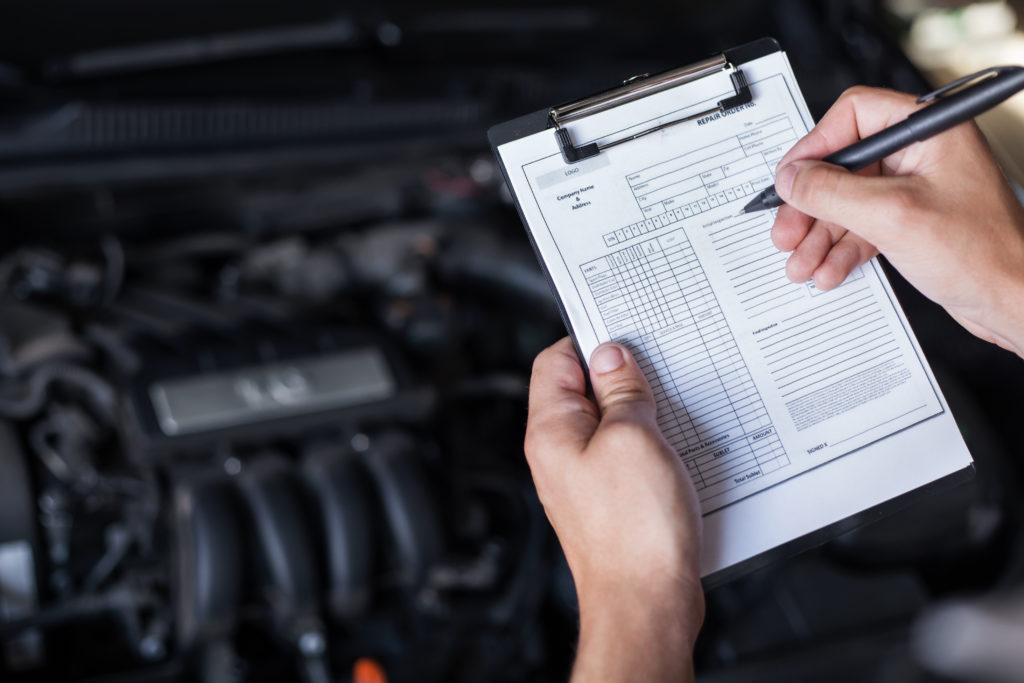Right now, vehicle prices are skyrocketing, making it more challenging than ever to find a good used car. Unfortunately, while most sellers are honest, there are undoubtedly unscrupulous individuals who see the current seller’s market as an opportunity to unload undercover clunkers.
To avoid purchasing a car that will only bring you heartache, you’ll want to take several steps to protect yourself, one of which is getting a pre-purchase inspection.
A pre-purchase inspection is just what it sounds like—a service where a professional inspects the vehicle you’re considering buying. Although a pre-purchase inspection doesn’t necessarily guarantee that your car will be trouble-free, it does provide a significant level of protection and reassurance.
Five Steps for Getting a Pre-Purchase Inspection and Avoiding a Lemon

Determining the condition of a vehicle from a private party can be tough. To make finding the right car easier, we’ve created a roadmap to help you navigate the uncharted territory of getting a pre-purchase inspection and avoiding a lemon.
1. Make Sure the Vehicle is Inspection-worthy
Because a pre-purchase inspection isn’t cheap, you’ll want to be sure you’re genuinely interested in a particular vehicle before requesting the service. Here are a few things you’ll want to do beforehand:
Ask the Seller Important Questions
It’s a good idea to contact the seller and ask them a few questions before doing anything else. For example, you’ll want to inquire whether the vehicle has a clean title (meaning it has not been totaled) and if there are any known problems. The answers to important questions, such as these, can help you determine if the car is even worth considering.
Obtain a Vehicle History Report
When considering a used car, it’s vital to get a vehicle history report from CarFax or a similar service. Vehicle history reports document accidents, service records, and other data that will help you make an informed decision regarding your potential car.
Check the Vehicle Out in Person (if Possible)

You’ll want to view and test drive the vehicle in person if possible. Also, while you’re at it, ask to view the title and any maintenance records. Once you confirm the car is what you’re looking for, you can move forward with finding an inspection provider to help you determine whether it’s mechanically sound.
2. Locate a Reliable Pre-purchase Inspection Provider
At this point, you’re ready to find a quality inspection provider to check over the vehicle. You can choose one of two options—you can either rely on a local repair shop (almost any shop will be willing to perform a pre-purchase inspection) or a mobile inspection agency. Both options have their advantages.
The pros of choosing a local repair facility include:
- Local repair shops have hoists available for a thorough inspection of the car’s undercarriage. Mobile inspection agencies generally do not have access to a hoist.
- You can talk to the repair facility (and in some cases, the mechanic) directly and get a repair estimate.
- If emissions testing is required where you live, you can get that done at the same time as the pre-purchase inspection.
- If you’re considering a performance car or a less common brand (for example, Volvo or BMW), you may be able to find a repair facility that specializes in those vehicles.
The pros of choosing a mobile inspection agency include:
- Most mobile inspection agencies are nationwide, which means you can get an inspection performed remotely, even if you’re in a different state than the vehicle.
- Because mobile inspection agencies specialize in inspections, they tend to offer more detailed reports than repair shops.
- Mobile inspections are convenient—an inspector is dispatched to the vehicle’s location and you get an online report documenting the findings.
Regardless of whether you choose a repair facility or a mobile inspection agency, you’ll want to do your homework to ensure you select a quality inspection provider. Here are three things to look for when making your decision:
A Good Reputation

Start by looking into the inspection provider’s reputation. Online reviews from sources, such as Google and the Better Business Bureau, can tell you a lot about a company and how it operates.
You can also do some background research to determine whether a shop or mobile agency has been in business for a long time. If the company has been around forever, there’s a good chance it provides top-notch service.
Another option is to ask friends and family for advice. If someone you know has had an exceptional experience with an inspection provider, you probably will as well.
A Thorough Inspection Process
Because some shops and agencies provide a more thorough inspection than others, you’ll want to find out what a particular company’s process involves. Inspection agencies often have checklists and sample reports that you can view to determine the comprehensiveness of the inspection process. Many local repair shops also have a checklist that you can view to see what will be inspected.
Experience
An inspection agency will typically dispatch an inspector to the vehicle’s location. Ask what criteria the company uses to select its inspectors and whether the inspectors have Automotive Service Excellence (ASE) certification. ASE certification is the industry standard for automotive professionals.
Should you choose to visit a local repair shop, an automotive technician (mechanic) will be the one performing the pre-purchase inspection. You’ll want to ask what kind of experience the technician has and whether they’re ASE certified.
It’s also a good idea to ask what types of vehicles the technician is used to working on. You want to find someone familiar with the make and model of vehicle that you’re considering buying.
3. Schedule an Inspection
Finally, the legwork is done and you’ve settled on an inspection provider. You can now move forward with scheduling an inspection. Since decent used cars are currently selling quickly, you’ll want to make the appointment as soon as possible to avoid losing the vehicle to another buyer.
4. Review the Inspection Report
Take a look at the inspection report once it’s complete. Major problems, such as engine and transmission issues, should be a dealbreaker. But if the vehicle has some minor concerns (e.g., worn-out tires), you might be able to use the defects as leverage to get a better deal.
If you had the inspection done at a local repair shop, ask for an estimate on the recommended repairs. You can use the estimate as a tool when haggling with the seller.
5. Enjoy Your Purchase (or Celebrate Dodging a Bullet)

The best part of receiving a pre-purchase inspection is the peace of mind you have while driving away in your new-to-you vehicle. You can crank up the tunes and hit the open road knowing that you took all of the necessary precautions to make a smart purchase.
Unless, of course, the inspection report reveals the vehicle you were considering is a total lemon. If that’s the case, be happy that you dodged a bullet—and continue searching for the car of your dreams.
Any information provided on this Website is for informational purposes only and is not intended to replace consultation with a professional mechanic. The accuracy and timeliness of the information may change from the time of publication.
















